Liverpool FC 1987/88: Poetry In Motion
The Season That Shaped a Generation
The 1987/88 season marked a pivotal moment in Liverpool FC’s history. As an 11-year-old fan, this was the year football moved from fascination to obsession. Liverpool didn’t just win games that season. They played. They glided, they flowed, they expressed. They were so good it almost didn’t seem fair.
For many of us, that team wasn’t just the best we’d ever seen; it was the team that taught us what football could be. Creative, intelligent, instinctive. The phrase ‘Poetry In Motion’ became more than just a slogan; it became a feeling. And if you were lucky enough to experience it, it never left you.
Poetry In Motion Was More Than a Banner
There’s a banner on the Kop with John Barnes in full flight and those three immortal words: “Poetry In Motion”. It captures what that team was. Movement, rhythm, beauty. They didn’t just win, they sang.
Years later, I had the surreal experience of interviewing John Barnes when he released a documentary called Poetry In Motion. Sitting with him and hearing his thoughts at that time was like reaching through the decades and shaking hands with your childhood. The man I watched in awe was now someone I’d worked with, but the sense of wonder never fades.
Dalglish – The King Who Led By Example
Kenny Dalglish’s influence on Liverpool FC goes far beyond trophies. He was the club's soul, first as a player and then as a manager. But in 1987/88, he elevated himself into a new tier.
Dalglish didn’t just manage that team; he built it. From the ashes of Heysel, he had rebuilt Liverpool’s identity with intelligence and quiet strength. And by the summer of 1987, he was ready to unveil something truly special. The arrivals of John Barnes, Peter Beardsley and John Aldridge transformed Liverpool’s attack and gave Dalglish the perfect tools to realise his footballing vision.
As a manager, Dalglish was ahead of his time. His approach was based on simple but powerful principles: dominate possession, move relentlessly, and create chances through intelligent movement rather than brute force. But what set him apart was his ability to balance freedom with structure. He allowed his players to express themselves within a clear system, and it produced some of the finest football English fans had ever seen.
Dalglish’s tactical setup typically featured a 4-4-2, but it was anything but rigid. It shifted constantly depending on the movement of his forwards and the fluidity of his midfield. Players were encouraged to interchange, take risks, read the game, and act decisively. The team's rhythm came not from set plays but from an understanding cultivated on the training ground and reinforced through trust.
That trust was mutual. Dalglish led by example. As player-manager, he didn’t demand anything from his players that he wouldn’t do himself. Whether dropping into midfield to collect the ball or threading passes through tight channels, Dalglish showed what leading with class and intelligence meant. His presence demanded more from the team, and they rose to meet it.
His impact stretched far beyond the touchline. Dalglish was a unifying force who understood what Liverpool meant to the city and what the city expected from its football club. He embodied those values: dignity, grit, and pride, translating those values into a style of play that became synonymous with success.
What made the 1987/88 season so special wasn’t just that Liverpool won the league; it was how they did it. They weren’t just beating teams; they were dismantling them. And behind it all was Dalglish – shaping, guiding, inspiring. ‘The King’ had forged a team in his image: intelligent, fluid, fearless.
Barnes, Beardsley and Aldridge – A Triumvirate of Brilliance
The chemistry between John Barnes, Peter Beardsley, and John Aldridge wasn’t just practical but transcendent. They turned football into choreography. Each player brought something distinct, but together, they created a kind of harmony that most teams never achieve.
John Barnes – The Flamboyant Catalyst
The arrival of John Barnes in 1987 wasn’t just a great signing; it was a generational shift. Before Barnes, wingers were expected to hug the line, whip in crosses and track back. Barnes changed the script. He didn’t just beat defenders, he erased them. He brought invention, precision, and something English football hadn’t seen before: total technical command mixed with pure power.
From his first appearance, it was clear Liverpool had something extraordinary. Barnes could float past two, three, four players like they weren’t there. His balance, timing, and control were surreal. But it was his intelligence that made him world-class. He knew exactly when to drive, when to pause, and when to release the ball. He dictated games from the flank, pulling strings with the elegance of a number 10 in a winger’s body.
Statistically, his 15 league goals were impressive, but they barely scratch the surface. Barnes wasn’t just productive, he was transformative. He gave Liverpool width, unpredictability, and tempo. He combined effortlessly with Beardsley, drew defenders away from Aldridge, and made the whole side more dangerous.
But Barnes’s significance went beyond football. As one of the few Black players in English football at the time, he faced relentless racism from the terraces. But at Anfield, he was a hero. The Kop sang his name with pride. His presence was a point of unity, of defiance. His brilliance was undeniable, and he played with the grace and confidence of someone who knew he was changing things.
I’ve since had the honour of working with Barnes through Anfield Index. Whenever I hear him speak about football or life, I’m struck by his clarity and insight. And every time I watch his old clips, I remember exactly how it felt to see him play live: like witnessing something from another realm.
Barnes wasn’t just part of Liverpool’s Poetry In Motion. He was the poetry.
Peter Beardsley – The Silent Genius
Beardsley was the architect in the shadows. He didn’t need flash or noise; he just understood. His movement was instinctive, his link play immaculate, and his touch so clean it looked effortless.
Operating in those undefined spaces between midfield and attack, Beardsley read the game better than anyone. He'd drift, drag defenders, and play angles that didn’t exist on the chalkboard. He was the connector between Dalglish’s vision and the team’s execution.
His interplay with Barnes was telepathic. They moved like dancers, always a step ahead. Beardsley’s subtle passes opened up entire defences, and his presence gave Liverpool unpredictability.
Working with him in my podcasting career was a pleasure. He remains humble, sharp, and still in love with the game. Watching him in 87/88 was watching a masterclass in footballing intelligence.
John Aldridge – The Finisher
If Barnes was the painter and Beardsley the tactician, Aldridge was the assassin. Ruthless, clinical, dependable. He wasn’t there to dazzle; he was there to finish. And he did that better than anyone in the country.
Aldridge scored 29 league goals that season, but his goals stood out because of their manner; instinctive finishes, perfectly timed runs, and the ability to be in the right place every single time. He allowed the others to create by being consistently available in the box, ready to punish any lapse in concentration.
His chemistry with Beardsley and Barnes was perfect. They found him because he was always there. His intelligence was underrated; not flashy, but football-smart.
Now, as someone I’ve worked with at Anfield Index, Aldo’s insight and honesty are as sharp as ever. He speaks as he played, straight to the point, no messing.
More Than Just a Title
Liverpool didn’t just win the First Division in 1987/88, they obliterated it. They finished nine points clear, went unbeaten at Anfield, scored 87 goals and conceded only 24. But even those dominant numbers don’t tell the whole story.
It was the style of it. The grace. The way Liverpool played with their heads up, with joy, with absolute control. Every match felt like a performance, not a job. They played as if they knew they were the best, because they were.
A Lost European Legacy
The only asterisk against that team is what we were robbed of. The European ban meant they never got to test themselves against the continent’s best. No nights in the Bernabeu. No battles in Milan. And yet, anyone who watched them knew; they would have matched anyone.
They were built for the European stage: technical, fast, and intelligent. Dalglish’s Liverpool would’ve gone toe-to-toe with AC Milan, Real Madrid, and anyone else. That we never saw it remains one of football’s great what-ifs.
Legacy of 1987/88
The 1987/88 team didn’t just raise the bar; they redefined it. Their influence is still visible in space, fluidity, and control discussions. They made winning beautiful and style essential.
For fans like me, they weren’t just footballers; they were teachers. They taught us how to watch, feel, and love football properly.
And now, decades later, working with those same icons - Barnes, Beardsley, Aldridge, even Dalglish - remains surreal. These are men who shaped my childhood and then entered my adult life. It was always a privilege, never taken for granted.
Full Circle
The 1987/88 season was more than a title-winning campaign. It was the season Liverpool played with joy, and brought joy. The team taught a generation that football could be both ruthless and beautiful.
And for me, it was the beginning of everything. If you’d told 11-year-old me that one day I’d host a podcast, speak to Kenny Dalglish regularly, and work alongside the players I idolised, I’d have thought you’d lost your mind.
But football has a funny way of bringing everything full circle.
And it all began with Poetry In Motion.



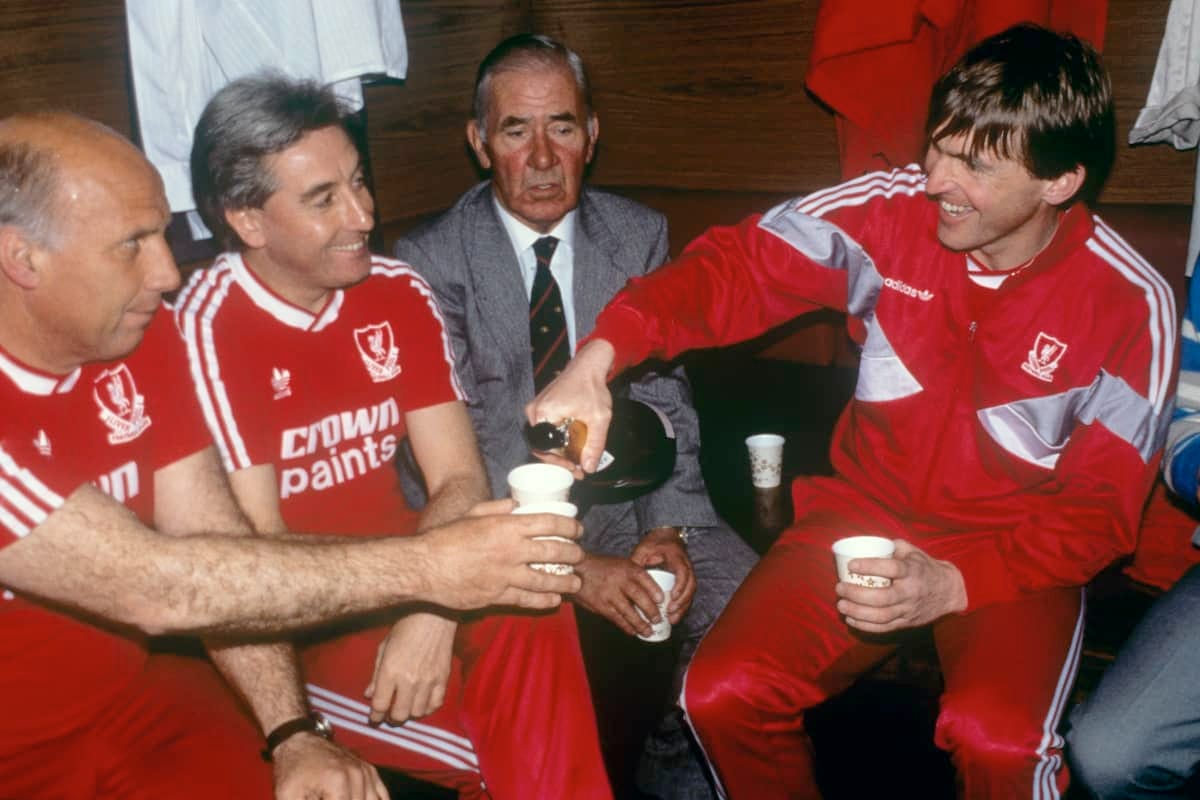
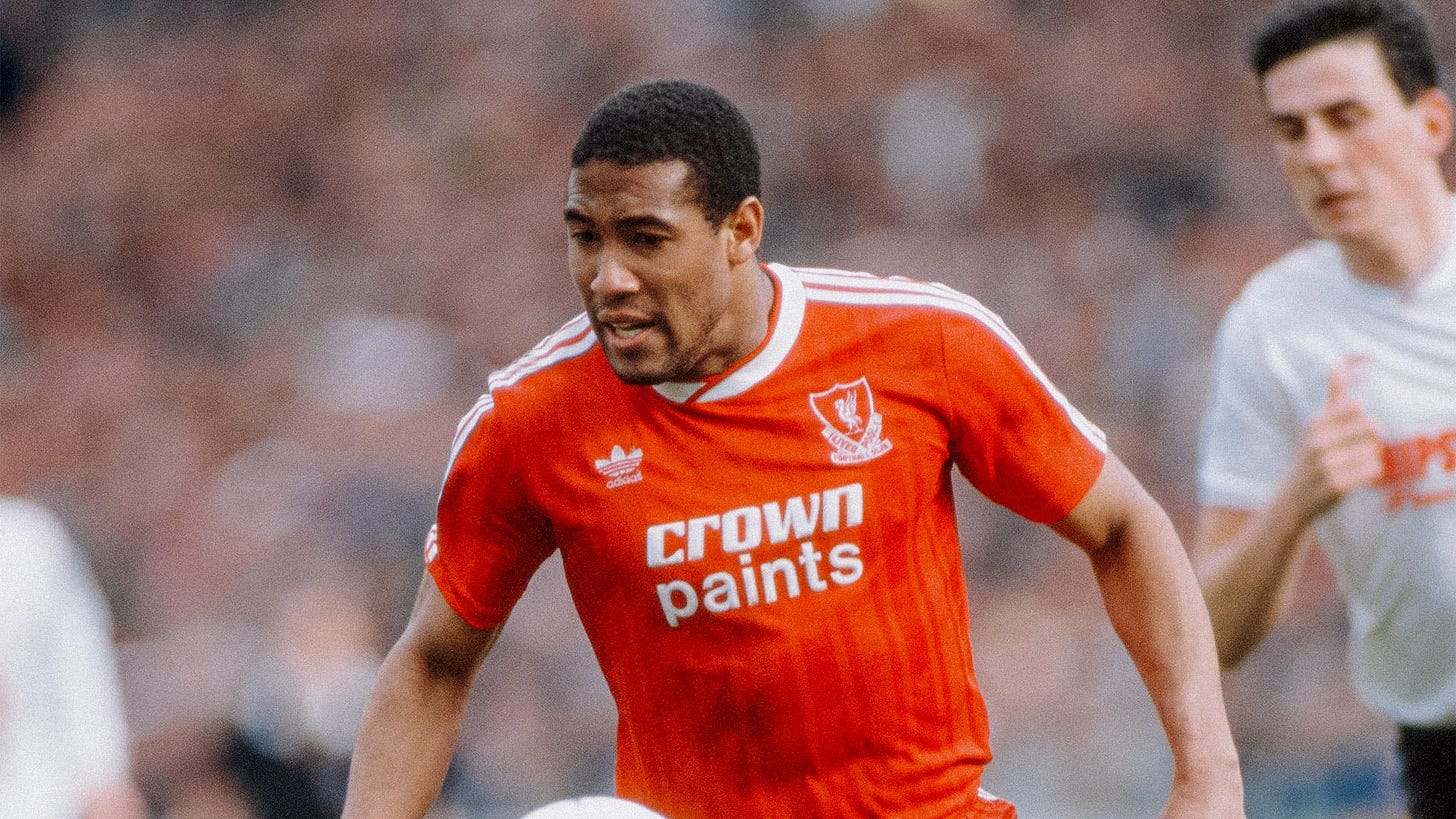
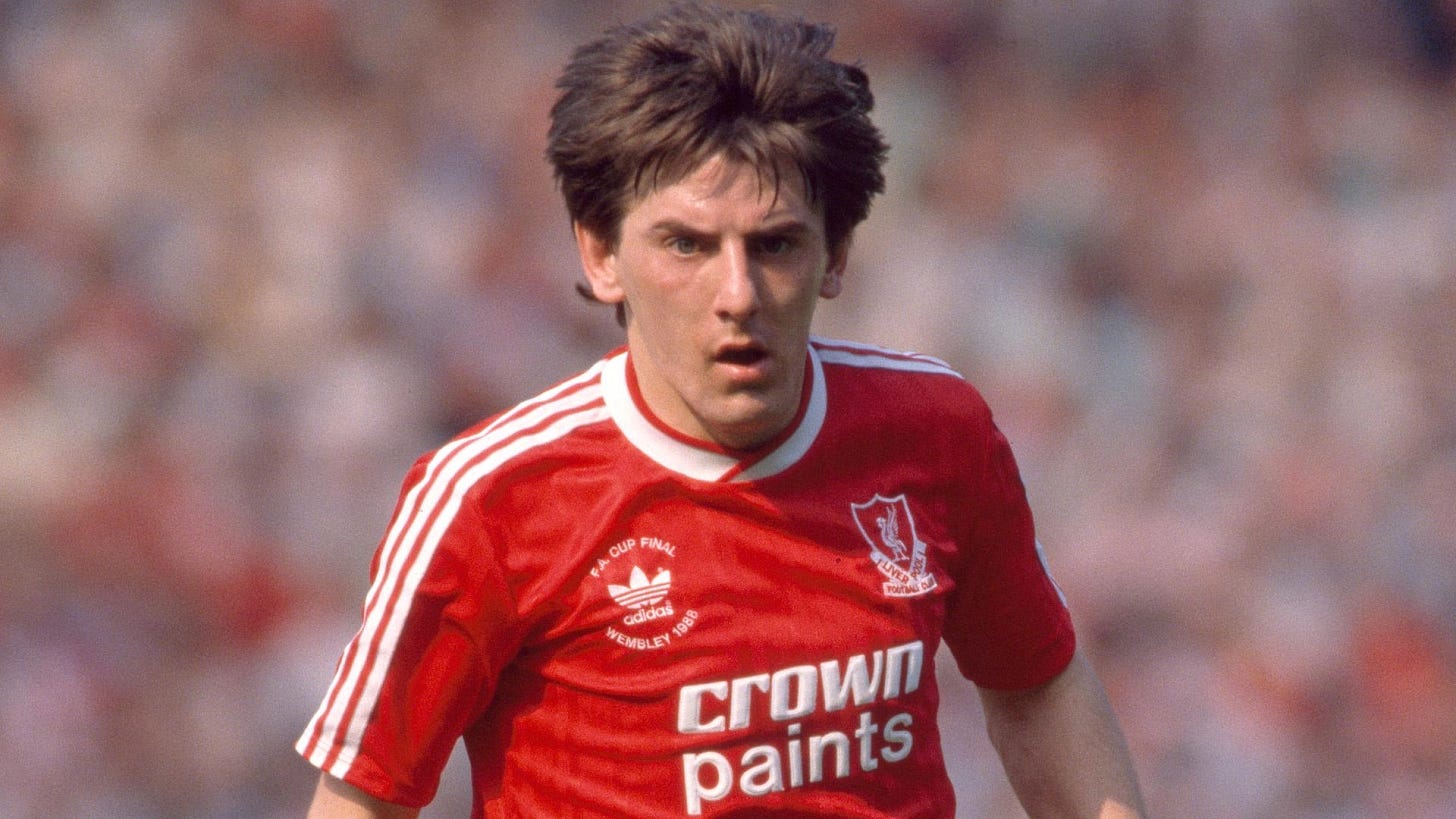
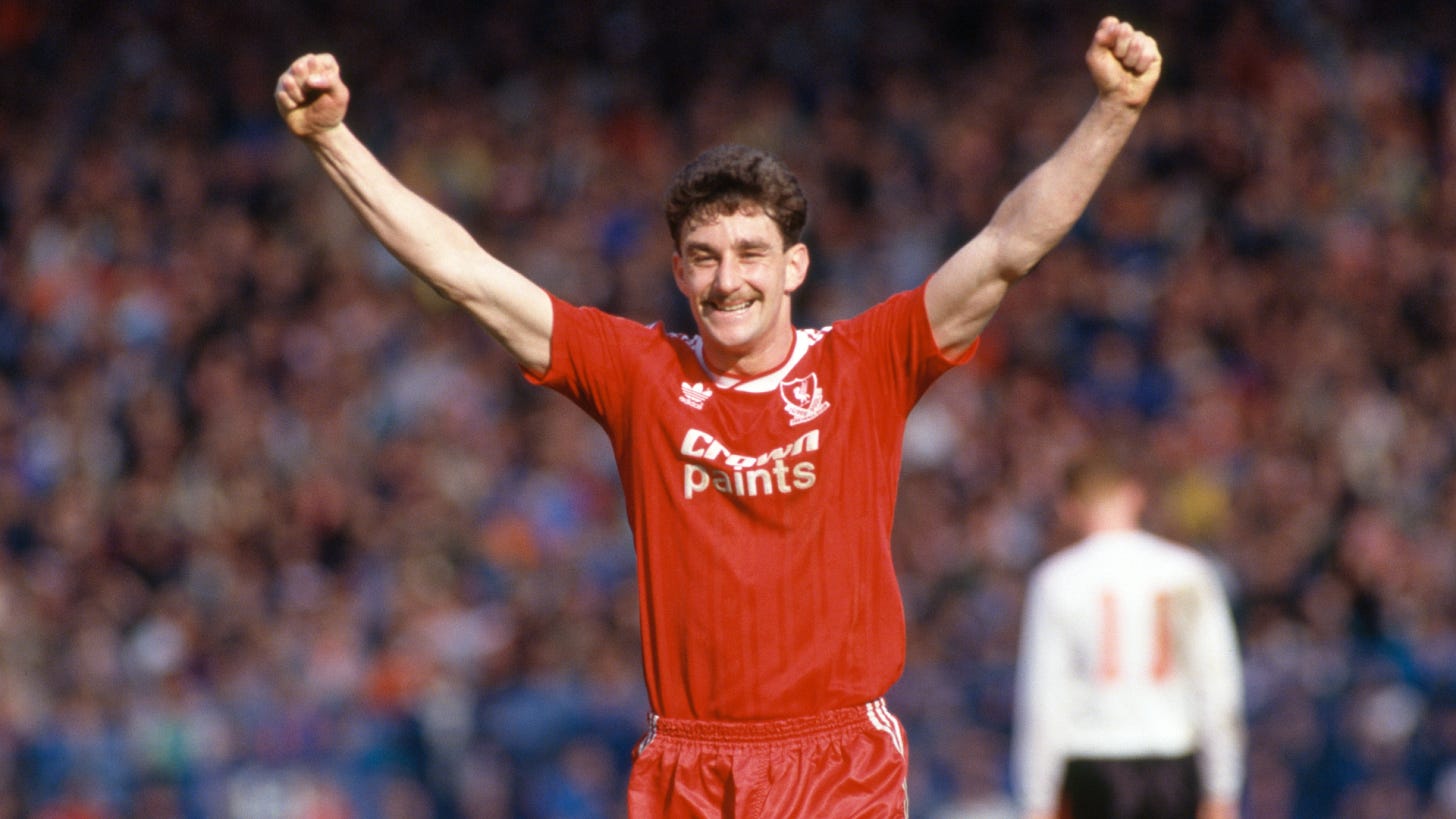
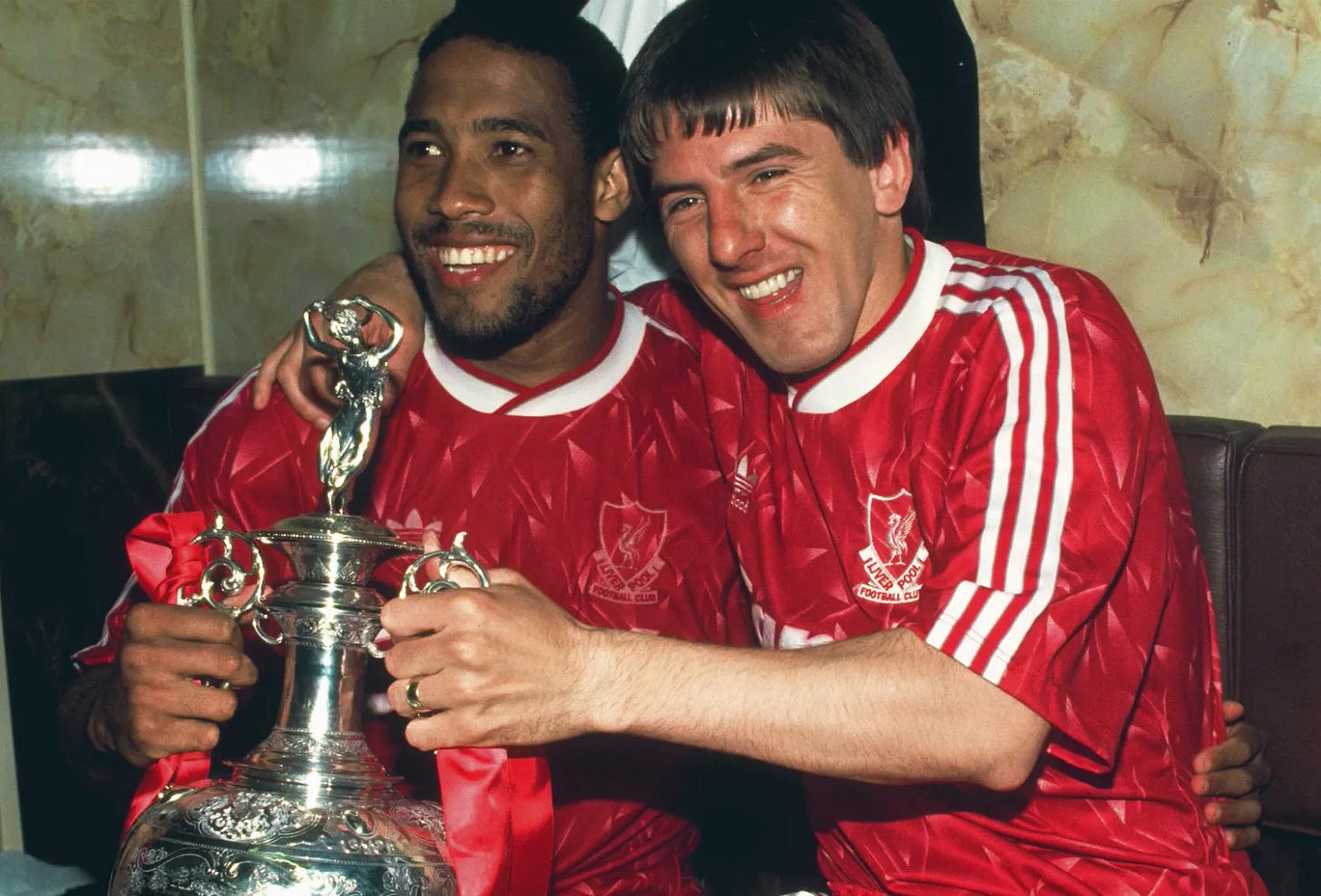
Great read Eddie, thanks for sharing. It's also wonderful to hear that the current gaffer understands the desire to win while playing beautiful football.
That was a team of artists-epitomised by the artistry of John Barnes.